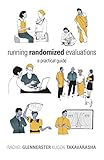Running Randomized Evaluations : A Practical Guide / Rachel Glennerster, Kudzai Takavarasha.
Material type: TextPublisher: Princeton, NJ : Princeton University Press, [2013]Copyright date: ©2014Description: 1 online resource (480 p.) : 50 line illus. 25 tablesContent type:
TextPublisher: Princeton, NJ : Princeton University Press, [2013]Copyright date: ©2014Description: 1 online resource (480 p.) : 50 line illus. 25 tablesContent type: - 9780691159270
- 9781400848447
- 001.4/34 23
- online - DeGruyter
- Issued also in print.
| Item type | Current library | Call number | URL | Status | Notes | Barcode | |
|---|---|---|---|---|---|---|---|
 eBook
eBook
|
Biblioteca "Angelicum" Pont. Univ. S.Tommaso d'Aquino Nuvola online | online - DeGruyter (Browse shelf(Opens below)) | Online access | Not for loan (Accesso limitato) | Accesso per gli utenti autorizzati / Access for authorized users | (dgr)9781400848447 |
Frontmatter -- CONTENTS -- PREFACE -- ABBREVIATIONS AND ACRONYMS -- 1 The Experimental Approach -- 2 Why Randomize? -- 3 Asking the Right Questions -- 4 Randomizing -- 5 Outcomes and Instruments -- 6 Statistical Power -- 7 Threats -- 8 Analysis -- 9 Drawing Policy Lessons -- APPENDIX: RANDOMIZED EVALUATIONS REFERENCED IN THIS BOOK -- GLOSSARY -- INDEX
restricted access online access with authorization star
http://purl.org/coar/access_right/c_16ec
This book provides a comprehensive yet accessible guide to running randomized impact evaluations of social programs. Drawing on the experience of researchers at the Abdul Latif Jameel Poverty Action Lab, which has run hundreds of such evaluations in dozens of countries throughout the world, it offers practical insights on how to use this powerful technique, especially in resource-poor environments. This step-by-step guide explains why and when randomized evaluations are useful, in what situations they should be used, and how to prioritize different evaluation opportunities. It shows how to design and analyze studies that answer important questions while respecting the constraints of those working on and benefiting from the program being evaluated. The book gives concrete tips on issues such as improving the quality of a study despite tight budget constraints, and demonstrates how the results of randomized impact evaluations can inform policy. With its self-contained modules, this one-of-a-kind guide is easy to navigate. It also includes invaluable references and a checklist of the common pitfalls to avoid. Provides the most up-to-date guide to running randomized evaluations of social programs, especially in developing countries Offers practical tips on how to complete high-quality studies in even the most challenging environments Self-contained modules allow for easy reference and flexible teaching and learning Comprehensive yet nontechnical
Issued also in print.
Mode of access: Internet via World Wide Web.
In English.
Description based on online resource; title from PDF title page (publisher's Web site, viewed 30. Aug 2021)


